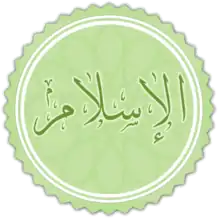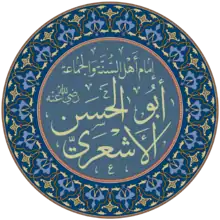Mar'i al-Karmi
Marʻī ibn Yūsuf ibn Abī Bakr Aḥmad al-Karmī (Arabic: مرعي بن يوسف بن أبي بكر بن أحمد الكرمي; 1580–1624), often referred to as Marʻī ibn Yūsuf al-Karmī, was Muslim scholar and one of the most famous Hanbali scholars.[2] He was born in Tulkarm city, and died in Cairo city. He is the author of a very large number of books in the Islamic religion.
Mar'i al-Karmi | |
|---|---|
مرعي الكرمي | |
 | |
| Personal | |
| Born | Mar'i Yusuf Abi Bakr al-Karmi مرعي يوسف أبي بكر الكرمي 1580 |
| Died | 1624 (aged 43–44) |
| Resting place | Tulkarm, Jerusalem, Cairo[1] |
| Religion | Islam |
| Nationality | |
| Ethnicity | Arab |
| Era | 16th century 17th century |
| Region | Arab world |
| Denomination | Sunni |
| Jurisprudence | Hanbali |
| Creed | Athari |
| Main interest(s) | Fiqh, Tafsir, Aqeedah |
| Notable work(s) | Dalīl al-ṭālib li-nayl al-maṭālib (in Arabic Wikipedia) |
| Education | Al-Azhar |
| Occupation | Scholar of Islam |
| Muslim leader | |
Influenced by
| |
Life
Mar'i al-Karmi he was born in Tulkarm city in Palestine on April 1580 in the sixteenth century.[1] There is a difference among Muslim scholars about his year of birth. al-Karmi grew up in Tulkarm city,[3] and was educated in his city,[4] then he studied Islamic sciences in Jerusalem.[3]
After that, he went to Egypt and join in Al-Azhar.[3] There, he studied with Shaykh Manṣūr al-Buhūtī.[5] Mar'i al-Karmi he became one of the famous scholars of Al-Azhar,[5] then he became the main Shaykh in Mosque of Sultan Hassan.[5]
Works
He was the author of more than one hundred books in many subjects such as Fiqh, Aqeedah, Tafsir, history, poetry and Quranic studies.[5] including:
Personal life
He was married and had two sons, Yahya and Ahmad.[5]
References
- "Marʿī ibn Yūsuf ibn Abī Bakr al-Karmī, 1580‒1623". Library of the Dominican Institute for Oriental Studies. 19 January 2003. Archived from the original on 12 January 2021. Retrieved 12 January 2021.
- "مرعي الكرمي". Dorar (in Arabic). Archived from the original on 12 January 2021. Retrieved 12 January 2021.
- "مرعي بن يوسف بن أبي بكر الكرمي". Palestinian Encyclopedia (in Arabic). 28 October 2015. Archived from the original on 12 January 2021. Retrieved 12 January 2021.
- "العلامة الشيخ مرعي الكرمي". tasawof (in Arabic). Archived from the original on 12 January 2021. Retrieved 12 January 2021.
- "Farid al-Salim, Landed Property and Elite Conflict in Ottoman Tulkarm, P75" (PDF). Institute for Palestine Studies. Archived (PDF) from the original on 22 July 2020. Retrieved 12 January 2021.
- "Karmī, Marʿī Ibn-Yūsuf, Dalīl aṭ-ṭālib li-nail al-maṭālib". Virtual International Authority File. Retrieved 12 January 2021.
- "Karmī, Marʿī Ibn-Yūsuf, Taḥqīq al-burhān fī ithbāt ḥaqīqat al-mīzān". Virtual International Authority File. Retrieved 12 January 2021.
- "Karmī, Marʿī Ibn-Yūsuf, Lafẓ al-muwaṭṭaʼ fī bayān al-ṣalāh al-wusṭá". Virtual International Authority File. Retrieved 12 January 2021.
- "Karmī, Marʿī Ibn-Yūsuf, Dafʻ al-Shubhah". Virtual International Authority File. Retrieved 12 January 2021.
- "Karmī, Marʿī Ibn-Yūsuf, Qalāʼid al-marjān fī al-nāsikh wa-al-mansūkh min al-Qurʼān". Virtual International Authority File. Retrieved 12 January 2021.
- "مَرْعي الكَرْمي". المحتوى الإسلامي (in Arabic). Archived from the original on 12 January 2021. Retrieved 12 January 2021.
